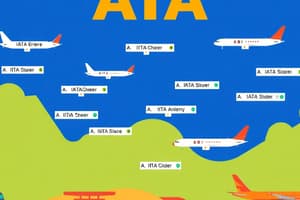Podcast
Questions and Answers
What is the primary function of ailerons on an aircraft?
What is the primary function of ailerons on an aircraft?
- To control the aircraft's speed.
- To control the aircraft's pitch.
- To control the aircraft's roll. (correct)
- To control the aircraft's yaw.
Which of the following best describes the purpose of a runway safety area (RSA)?
Which of the following best describes the purpose of a runway safety area (RSA)?
- To mark the boundaries of the aerodrome.
- To serve as a buffer zone for aircraft that overrun or veer off the runway. (correct)
- To provide a designated area for aircraft maintenance.
- To provide a parking area for aircraft waiting for takeoff clearance.
How do VOR (VHF Omnidirectional Range) stations primarily assist pilots during flight?
How do VOR (VHF Omnidirectional Range) stations primarily assist pilots during flight?
- By providing bearing information to the station. (correct)
- By providing real-time weather updates.
- By offering precise vertical guidance during landing.
- By measuring the distance to a ground station.
What is the role of Aircraft Maintenance Engineers (AMEs)?
What is the role of Aircraft Maintenance Engineers (AMEs)?
Which factor is most critical in determining the required length and orientation of a runway?
Which factor is most critical in determining the required length and orientation of a runway?
An airport is experiencing significant bird activity on and around the runways. What is the most appropriate measure to mitigate the risk of bird strikes?
An airport is experiencing significant bird activity on and around the runways. What is the most appropriate measure to mitigate the risk of bird strikes?
What is the main purpose of an Instrument Landing System (ILS)?
What is the main purpose of an Instrument Landing System (ILS)?
Which of the following technological advancements is aimed at reducing aviation's environmental impact?
Which of the following technological advancements is aimed at reducing aviation's environmental impact?
What is the function of the empennage (tail) of an aircraft?
What is the function of the empennage (tail) of an aircraft?
Which of the following services falls under ground handling operations at an aerodrome?
Which of the following services falls under ground handling operations at an aerodrome?
Flashcards
Aircraft
Aircraft
Any machine capable of atmospheric flight, including airplanes, helicopters, gliders, airships, and balloons.
Aerodrome
Aerodrome
A defined area on land or water used for aircraft arrival, departure, and surface movement; includes airports, airfields, and heliports.
Runways
Runways
Designated areas for aircraft to take off and land.
Taxiways
Taxiways
Signup and view all the flashcards
Aprons
Aprons
Signup and view all the flashcards
Fuselage
Fuselage
Signup and view all the flashcards
Empennage
Empennage
Signup and view all the flashcards
Air Traffic Control (ATC)
Air Traffic Control (ATC)
Signup and view all the flashcards
Foreign Object Damage (FOD)
Foreign Object Damage (FOD)
Signup and view all the flashcards
VOR (VHF Omnidirectional Range)
VOR (VHF Omnidirectional Range)
Signup and view all the flashcards
Study Notes
- Aircraft and aerodromes are fundamental elements of aviation
Aircraft
- An aircraft is any machine capable of atmospheric flight
- Includes airplanes, helicopters, gliders, and lighter-than-air vehicles like airships and balloons
Aerodromes
- An aerodrome is a defined area on land or water used for the arrival, departure, and surface movement of aircraft
- Includes airports, airfields, and heliports
Aerodrome Components
- Runways are designated areas for aircraft to take off and land
- Taxiways are paved paths connecting runways to aprons and other areas
- Aprons are areas for parking, loading, and unloading aircraft
- Control towers house air traffic controllers who manage aircraft movements
- Navigation aids (NAVAIDs) provide guidance to pilots
Aircraft Design and Function
- Wings generate lift, enabling the aircraft to fly
- Fuselage is the main body, housing the crew, passengers, and cargo
- Empennage (tail) provides stability and control
- Engines provide thrust, propelling the aircraft forward
- Control surfaces (ailerons, elevators, rudder) allow the pilot to maneuver the aircraft
Aircraft Types
- Airplanes are fixed-wing aircraft powered by engines
- Helicopters use rotors to generate lift and thrust
- Gliders are unpowered aircraft that rely on air currents to stay aloft
- Airships and balloons are lighter-than-air craft that float due to buoyancy
Aerodrome Operations
- Air traffic control (ATC) manages aircraft movements to ensure safety and efficiency
- Ground handling services include baggage handling, refueling, and aircraft maintenance
- Security measures are in place to prevent unauthorized access and ensure passenger safety
- Weather services provide pilots with real-time weather information
- Emergency services are available to respond to accidents and incidents
Aerodrome Design and Layout
- Runway length and orientation are determined by aircraft performance requirements and wind conditions
- Taxiway layout is designed to minimize congestion and delays
- Apron size and configuration depend on the number and type of aircraft using the aerodrome
- Lighting and marking systems enhance visibility and safety, especially at night or in poor weather
- Drainage systems prevent water accumulation on runways and taxiways
Aircraft Navigation
- Pilots use various navigation aids to determine their position and course
- VOR (VHF Omnidirectional Range) is a ground-based radio beacon that provides bearing information
- DME (Distance Measuring Equipment) measures the distance between the aircraft and a ground station
- GPS (Global Positioning System) is a satellite-based navigation system
- Instrument landing system (ILS) provides precise guidance during approach and landing
- Required navigation performance (RNP) is a type of performance-based navigation that allows aircraft to fly precisely-defined paths using sophisticated onboard systems
Aerodrome Safety
- Foreign object damage (FOD) is a major hazard that can damage aircraft engines and tires
- Bird strikes can cause significant damage to aircraft
- Wildlife management programs are implemented to minimize the risk of bird and animal collisions
- Runway safety areas (RSAs) provide a buffer zone for aircraft that overrun or veer off the runway
- Safety management systems (SMS) are used to identify and mitigate risks
Aircraft Maintenance
- Regular maintenance is essential to ensure aircraft airworthiness
- Inspections are performed to detect any signs of wear, damage, or corrosion
- Scheduled maintenance tasks are carried out according to the manufacturer's recommendations
- Repairs are performed to correct any defects that are found
- Aircraft maintenance engineers (AMEs) are licensed to perform maintenance on aircraft
Aerodrome Certification
- Aerodromes must be certified by aviation authorities to ensure they meet safety standards
- Certification requirements vary depending on the type of aerodrome and the type of aircraft that use it
- Aerodrome operators must have a manual that describes the aerodrome's operating procedures
- Regular inspections are carried out to ensure compliance with certification requirements
Environmental Considerations
- Aircraft noise can be a significant nuisance to people living near aerodromes
- Air pollution from aircraft engines can contribute to climate change
- Environmental impact assessments are required for new aerodrome projects
- Noise abatement procedures are used to minimize the impact of aircraft noise
- Sustainable aviation fuels (SAF) are being developed to reduce emissions
Future Trends
- Unmanned aircraft systems (UAS), or drones, are becoming increasingly common
- Electric aircraft are being developed to reduce emissions and noise
- Advanced air mobility (AAM) is a new concept that involves using electric vertical takeoff and landing (eVTOL) aircraft for urban transportation
- Smart airports are using technology to improve efficiency and safety
- Automation is being used to reduce workload for pilots and air traffic controllers
Studying That Suits You
Use AI to generate personalized quizzes and flashcards to suit your learning preferences.




